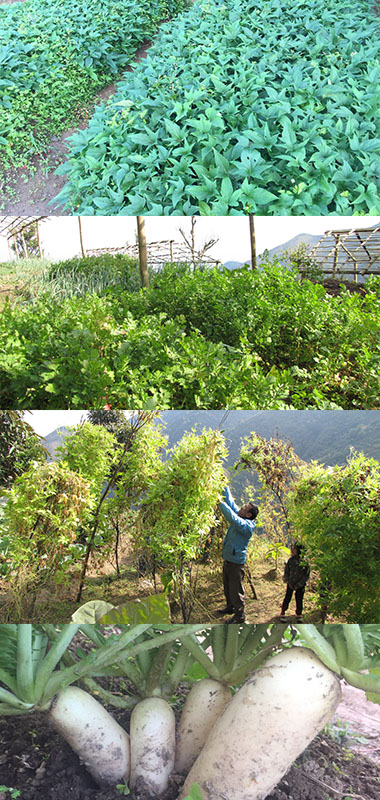Organic farm
Making the Change to Organic Farming and its Benefits to the Tourism Sector, Local Communities and the Environment.
Currently, we are facing a number of factors that are causing environmental degradation, air pollution, water pollution, deforestation and natural imbalance. One of the reasons behind this is the practice of inorganic farming in rural Nepal. Though chemical farming may increase productivity and income for the farmer, the use of chemicals and pesticides causes damage and infertility not only to soil, natural vegetation, native animals and water pollution; it also creates serious health problems to the farmers themselves, people within the communities and those who consume it.
The main drawback and lacking of organic farming is the commitment to make the change towards better environment practices. There may be multiple reasons, like increased income, lack of technology and knowledge that stop farmers from making the change, but the reasons to make the change to organic farming for a better environment should not be overlooked. We must remember that without a pristine natural environment, we would lose our number one marketing brand of tourism product, Nepal’s Natural Environment, the effect of which would be detrimental to the tourism industry and the livelihoods of thousands of Nepalese. Organic farming is not exactly a new concept of farming in Nepal. In the past all Nepali farms were organic farms in albeit restricted approach. The newly adopted term has expanded the scope of farm related activities to encompass the entire gamut of farming that includes fishery, poultry or animal husbandry, community lodge, home stay as well, making farming a more comprehensive, all inclusive activity.
What we are aiming to achieve is to promote the benefits of organic farming to the farmer, to the local community and to our resort itself. Of course a farmer will not embark on the changes needed to undertake organic farming if he is not supported and receives no profit from doing so. First and foremost, the man of the land must be able to make a sustainable living from his work. We understand ,the successes for change cannot be made by organic farming alone; it must come in combination with tourism as it provides the market for own consumption and as such we work together to achieve the goal is essential to the success of organic farming. This is where the local
community, and more so the Hotel and tourism sectors can come in.
The switch will not initially be easy, but the benefits of organic farming are multiple through all levels of society and most importantly the move towards organic produce, farming methods and life styles is crucial to the future preservation of our environment, the health of community members and the economic stability of the tourism industry.
